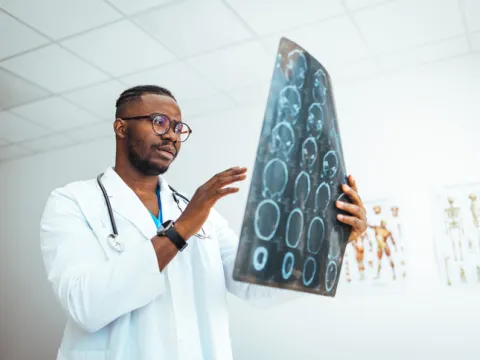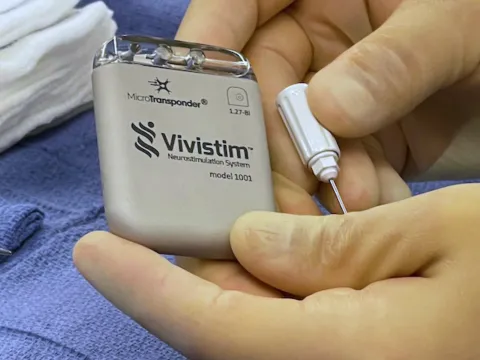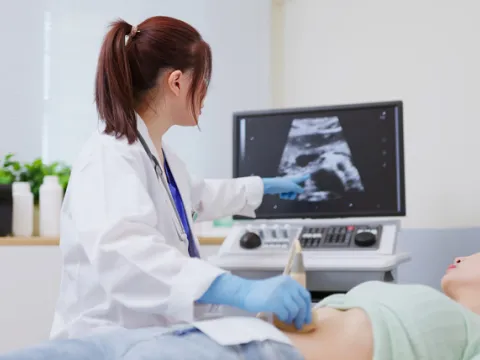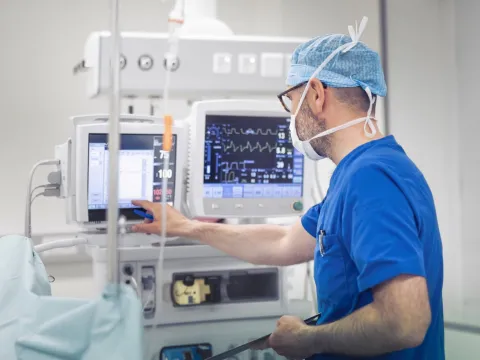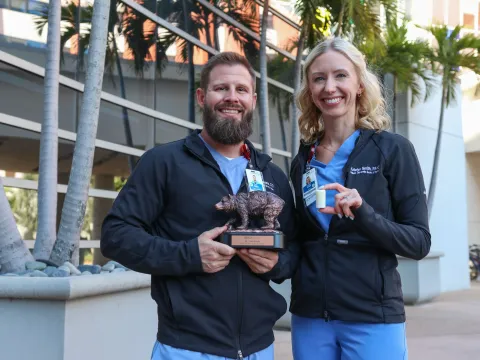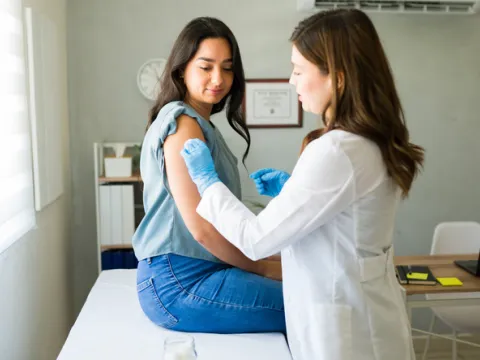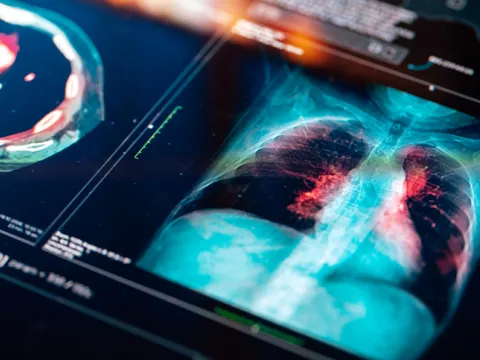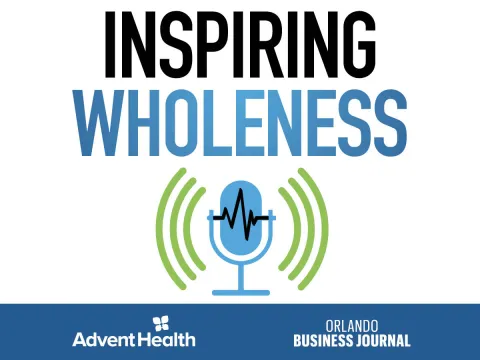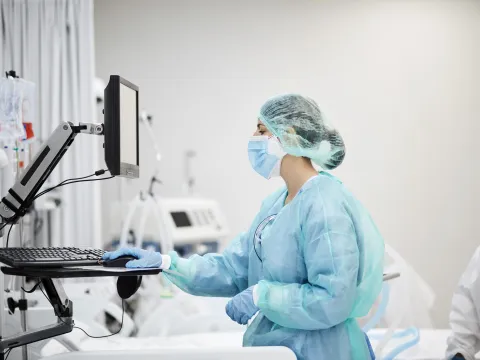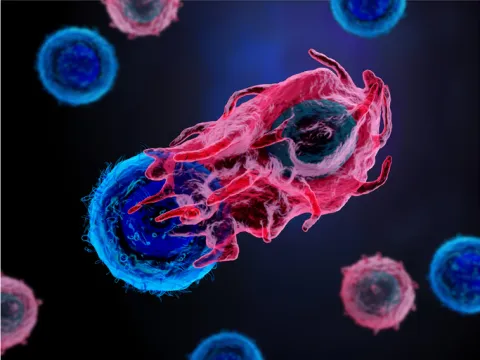- AdventHealth
On Aug. 3, Barry Friedman, executive director of the AdventHealth Transplant Institute addressed the U.S. Senate Committee on Finance, along with other senators and health care leaders, to shed light on the failures of the United Network for Organ Sharing (UNOS), a nonprofit that manages the country’s organ transplants.
AdventHealth leader Barry Friedman testifies in front of the U.S. Senate Finance Committee on August 3, 2022
“This system has failed many patients waiting for organ transplant due to lack of oversight and accountability,” Friedman said during his testimony.
As a transplant surgeon specializing in kidney and pancreas transplant and laparoscopic surgeries, Bobby Nibhanupudy, M.D., agrees there are gaps in the system that must be addressed. Nibhanupudy serves as the medical director of abdominal transplant at the AdventHealth Transplant Institute and OurLegacy, the region’s organ procurement agency, and has first-hand experience with the inequities. To his frustration, organs from donors have frequently been repeatedly lost or damaged.
Nibhanupudy highlighted one problem – transportation. Private transportation is arranged for organs with a shorter shelf-life, but for kidneys, commercial airlines are typically used to transport the kidney to the recipient.
Kidneys make up about 75% of AdventHealth’s total transplants and Nibhanupudy says there is currently no standard way to track these organs.

“In many cases, organs must connect from one flight to another, leaving airline personnel responsible for (airline) transfers,” said Friedman. “While anyone can track their Amazon or FedEx package, there is currently no consistent way of tracking these life-saving organs.”
“We hear stories all the time of organs that don’t end up where they’re supposed to be, which could lead to a preventable death somewhere down the line,” said Nibhanupudy. “In one case, we sent an organ to California, and it wound up staying in the middle of the country because of a missed connection.”
Nationwide, approximately 23% of kidneys procured from deceased donors are not used and discarded, resulting in preventable deaths, according to the American Society of Nephrology and Organ Procurement Transplantation Network (OPTN).
This lack of standardized technology to track organs mirrors Friedman’s comments to the Senate, along with questioning the change in the new UNOS system. Under the previous allocation system, transplant waiting lists were maintained regionally, but now they are based on 250- to 500-mile radiuses and, in the case of kidneys, prioritize those on dialysis longer.
According to Nibhanupudy, these criteria can be flawed.
“Somebody who has been on dialysis for five years isn’t necessarily sicker than somebody who’s been on dialysis for two years,” said Nibhanupudy. “The new allocation system pulls kidneys away from mid-sized cities and states, like our mid-sized city, to higher populated cities just because they have a higher number of individuals who are on dialysis, which means their waitlists are bigger.”
On average, 22 people die each day, roughly one per hour, waiting for a life-saving organ transplant.
Since its inception in 1973, the AdventHealth Transplant Institute has performed more than 4,700 kidney transplants and more than 6,300 organ transplants, and the hospital could have performed more if not for the failures of the new organ allocation rules.
The AdventHealth Transplant Institute is the only adult and pediatric organ transplant program in Central Florida and one of only 63 programs in the U.S. that performs multi organ transplants. The transplant institute is a part of AdventHealth Orlando, recently ranked the No. 1 hospital in Central Florida by U.S. News & World Report and No. 2 in Florida.
To read more about the failed organ transplant system in a recent Washington Post article, click here. For more how the program has failed patients, read a recent Orlando Sentinel story featuring Nibhanupudy here.
Recent News
The AdventHealth Neuroscience Institute is the first in Florida and one of the first in the country to begin recruiting patients with primary progressive or non-active secondary progressive multiple...
Accurately determining food intake remains a challenge in nutrition research. A new study published in Nature Metabolism and co-authored by Dr. Corbin introduces a metagenomics-powered approach to...
Discover what’s being accomplished in Central Florida to bridge the health gap with Orange County Mayor Jerry Demings and AdventHealth’s Dr. Alric Simmonds.
Breakthrough device offers new hope for stroke survivors struggling with rehabilitation following ischemic stroke
Jennifer Seminerio, MD, recently became one of the first in Florida to use intestinal ultrasound (IUS) to help assess and manage treatment of patients with inflammatory bowel disease (IBD). A non...
The Convergent Hybrid Ablation procedure has been gaining acceptance as an effective treatment option for long-standing persistent atrial fibrillation (AFib) since the CONVERGE trial data published in...
Recently, AdventHealth for Children pediatric orthopedic surgeon Sean Keyes, DO, Katelyn Smith, PA-C, and their team performed their 100th bridge-enhanced anterior cruciate ligament (ACL) repair (BEAR...
Physician leaders from AdventHealth’s emergency department, infectious disease, inpatient, pediatrics and pharmacy teams all collaborated to develop a respiratory virus testing algorithm to assist...
Thoracic surgeon Colleen Gaughan, MD, and her team at AdventHealth Celebration, recently became one of the first in the country to incorporate targeted imaging agent Cytalux (pafolacianine) as part of...
On the newest Inspiring Wholeness podcast, Obie Diaz, local morning radio show host, shares how a routine physical eventually led to two open heart surgeries.
AdventHealth recently began piloting a new Genomics Risk Assessment for Cancer and Early Detection (GRACE) program that combines the use of digital mammography, artificial intelligence (AI) technology...
AdventHealth Clinical Research Unit (CRU) Executive Director and Medical Director of Genitourinary Oncology Guru Sonpavde, MD, co-authored an article on the AMBASSADOR Phase III clinical trial results...

